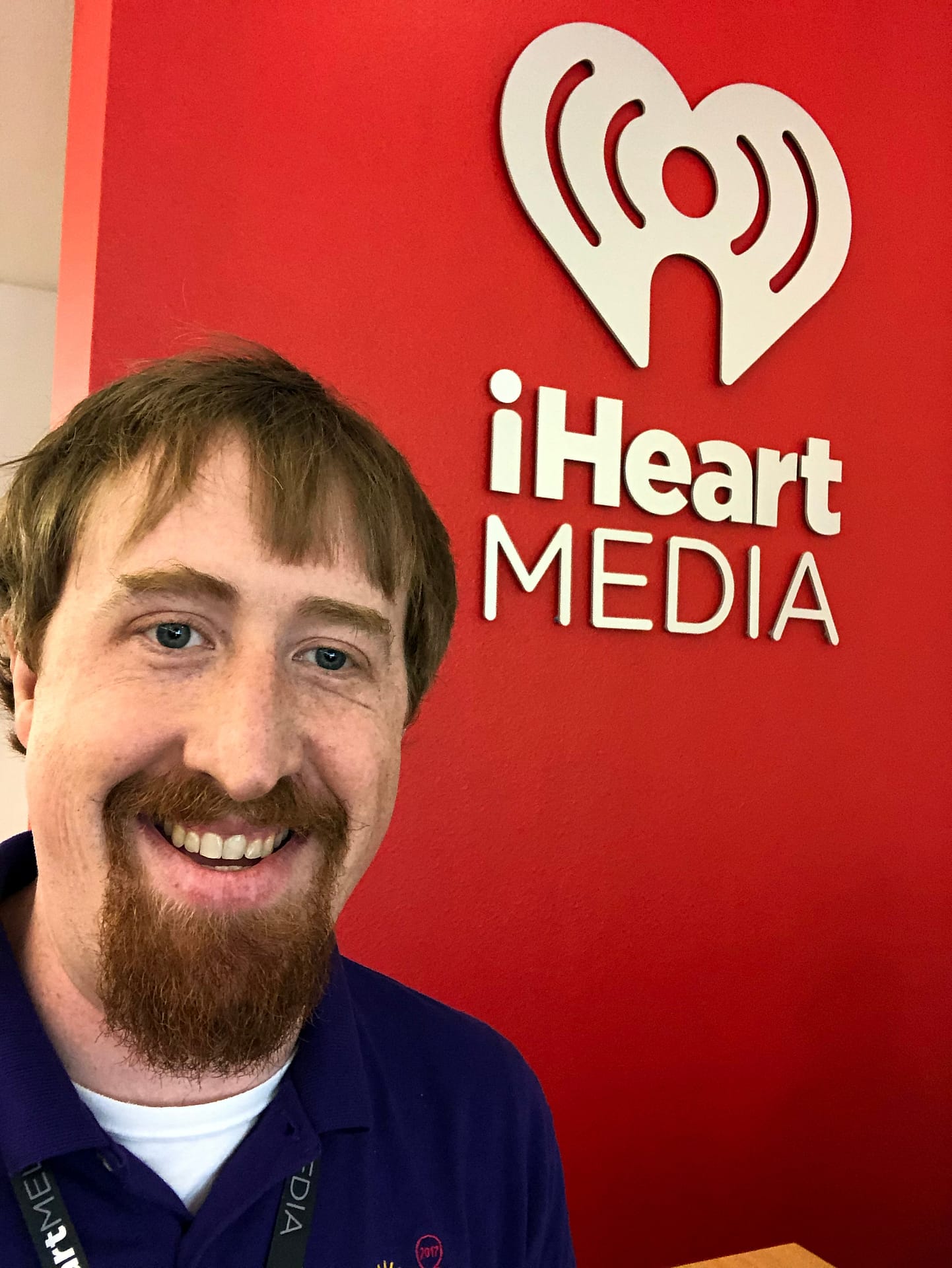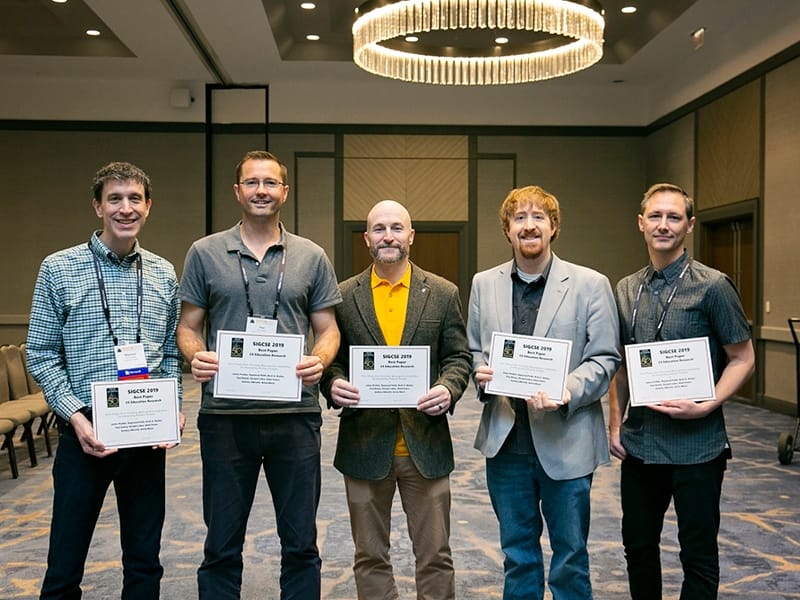Enlarge

Ten years ago, Dr. James Prather (’14) would have never guessed that God would lead him to the classroom. Today, he enjoys teaching courses in both computer science and Old Testament, has received numerous student-voted awards such as Teacher of the Year and Mentor of the Year, continues working with students on ground-breaking research projects, and leads weekly chapel and small group Bible studies for the students of his department.
Not too long ago, James was working as a full-time programmer. When asked why he began teaching, his simple response was, “Church.”
When James began teaching a Bible class at Prestoncrest Church of Christ in Dallas, he would tell people he was a programmer and they would say, “Why? You should teach.” The encouragement that came from fellow church members prompted him to start thinking seriously about becoming a professor.
Initially resistant to moving from big city Dallas to smaller Abilene, he kept hearing the words, “You should be a teacher.”
“At first, you know, you don’t really pay attention,” Prather said. “But when everyone starts to say it, you start to listen and think, well, maybe God’s trying to tell me something.”
He followed the calling to Abilene to pursue a Master of Divinity in Old Testament, thinking he would become a Bible professor. However, plans changed when he came to ACU in 2010 and the computer science department was looking for an adjunct professor. Since he already had a master’s degree in that field, he accepted the position.
He has been in teaching in that department since, and has encountered a variety of projects, awards and research along the way.
In 2015 and 2017, Prather was voted by Teacher of the Year by junior and senior students in the School of Information Technology and Computing.
“He goes out of his way to relate to the students and [show] he really cares about them,” said Zachary Albrecht, a computer science major from Boerne, who is Prather’s student research assistant. “He’s consistently good at both teaching the material well and making it entertaining in the process.”
To Prather, “the classroom is really important because that’s where I get to engage with student minds and wrestle with them over difficult problems, watch them grow and watch the lightbulb appear over their head, push them and make them think hard about difficult things like ethics in the field,” he said. “It’s the place where we get to exchange ideas and I get to grow from my students almost as much as they get to grow from me.”
He said he believes his high school and college career in theatre helped prepare him to be a professor, as he treats every lecture like a performance.
“If I’m here and I’m going to be engaged, I’m going to pull in the audience and draw them into the material,” he said. “Before they know it, it will be over and they’ll ask, ‘Where did the time go?’ That’s my goal, every class period.”
In 2018, Prather worked with a group of nine students on a project that was accepted to the student research competition for Special Interest Group for Computer Human Interaction (SIGCHI). His favorite class to teach is Human Computer Interaction, which focuses on the cognitive science approach to computing, studying the way people interact in the world and using that information to better technology.
“I had this group of students that had come through our program and they had taken all three of the classes that I do with that and they wanted to do more,” Prather said.
He encouraged the students, who were about to enter into their senior year, to begin a local chapter of SIGCHI on campus. The students quickly got on board and completed the paperwork and membership needed to start their own chapter.
Prather then introduced discussion of possible research projects, and the students decided to investigate social media encouragement. They ran an experiment with one of Prather’s classes, telling students to ask for encouragement on social media before taking a test. After reading the encouraging responses from family and friends, the students’ test grade averages increased.
The group performed additional experiments with Twitter bots versus human response and found that although the automated encouragement responses from the Twitter bots helped some, ultimately the greatest decrease in anxiety and increase in test score came from human encouragement over social media.
After the data had been collected and analyzed over the course of a semester, the team sent in their findings to the research competition for the SIGCHI conference and were accepted. They attended the international conference to present their work in Montreal, Canada.
“They were just a great group of students who loved to solve hard problems and were interested in research,” Prather said. “People would come by their poster and ask what grad school they were at, saying it was grad-level work.”
Before the SIGCHI conference, the students were invited to present their work at ACU’s Undergraduate Research Festival. At the festival, the students submitted Prather’s name for Undergraduate Research Mentor of the Year and tricked him into dressing up to accept the award.
“I miss them,” Prather said. “It’s one of the sad parts about being a professor. After four years, you become really close to these students. You walk alongside them long enough, they become your friends and then they go.”
The local SIGCHI chapter is still running under his oversight, and the current team has already begun work on a new research project.
Although most people may see Prather as a computer nerd, he is also an Old Testament nerd. He satisfies his passion for Bible teaching by leading his weekly departmental chapel, discipling through mentoring small-groups and teaching a course in the Bible department every now and then.
“What’s great about working at ACU is I didn’t have to put the things I wanted to do as a Bible professor on the shelf,” he said.
In June 2017, Prather taught a course on the Old Testament for Study Abroad in Oxford. In January 2013, he co-led a trip to Israel with Bible professor and friend Dr. Christopher Hutson.
“That was a blast, because Chris is a New Testament guy and I’m an Old Testament guy. So when we were there we would kind of trade off depending on where we were and tag-team it.”
Enlarge

Most recently, Prather won the Best Paper Award presented at the Special Interest Group in Computer Science Education (SIGCSE) conference. He worked with co-authors in writing the research paper on metacognitive scaffolding.
“It was an incredible honor to win that award,” he said.
The international conference invites thousands of researchers and educators and stands as the largest computing education conference in the world. Prather said when his co-authors kept talking about how they had never expected to win, he realized how big of a deal this really was.
“I think it makes me a better professor,” he said. “After coming back from last summer working for Faithlife, I could just tell the difference in me, night and day. … And then in class I could say, ‘Four weeks ago, I was doing this and here’s how we solved it.’ You know? I had new stories to tell. I think it brings credibility. I’m doing the thing that I’m training them to do.
During summer 2019, he worked with iHeartRadio as a user experience researcher looking at the effectiveness of advertising campaigns. The previous summer, he worked for Faithlife Corporation in Bellingham, Washington, creating academic Bible study software. In July, he traveled to Scotland to attend the 24th Annual Conference on Innovation and Technology in Computer Science Education (ITiCSE), where he worked with a group of international scholars to write and submit a research paper.
He enjoys spending his off-time working “on-the-ground,” since the technology industry is constantly advancing. Always having his students in mind, he hopes his time working in industry will help to bring attention to ACU and increase connections for future job opportunities for his students.
